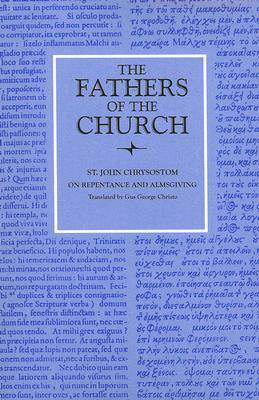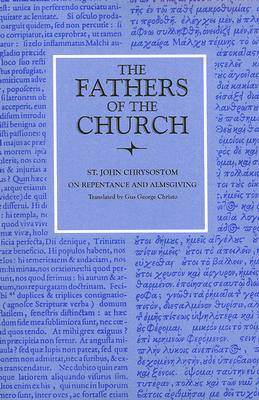
- Retrait gratuit dans votre magasin Club
- 7.000.000 titres dans notre catalogue
- Payer en toute sécurité
- Toujours un magasin près de chez vous
- Retrait gratuit dans votre magasin Club
- 7.000.0000 titres dans notre catalogue
- Payer en toute sécurité
- Toujours un magasin près de chez vous
Description
St. John Chrysostom delivered nine homilies on repentance in Antioch of Syria sometime between 386 and 387. With conviction and certitude, he preached that repentance was a necessity for both the sinner and the righteous man. This volume presents Chrysostom's homilies on repentance and includes a sermon on almsgiving that he preached in Antioch during the winter months in 387. Chrysostom's work reveals that repentance is an indestructible pillar of the All-Holy, Universal and Immutable Church of Christ. He believed that repentance is the liturgical tool that rejuvenates sinners and admits them into the life-giving Eucharist where they experience fully and dynamically the concrete presence of God. The powers of repentance have rich biblical roots, and Chrysostom masterfully weaves his teaching with a plethora of Old and New Testament citings. From Scripture, the reader learns that repentance is never confined to the eucharistic context--it becomes a way of life for the believer. The daily applications of repentance, such as almsgiving, fasting, remorse over personal sins, humility, prayer, and attending Church, suggest that a person's entire life has an ecclesial character. Chrysostom preached that the whole experience of a true life in Christ is repentance that culminates in metanoia--the total change and renewal from the heart and mind of sin to ""the mind of Christ"" (1 Cor. 2:16). In his introduction to the homilies, Fr. Gus Christo includes a succinct biography of Chrysostom within which he sets the homilies in their chronological context. He also provides an overview of repentance and discusses the ecclesiological nature of Chrysostom's theology. Gus George Christo is a priest of the Greek Orthodox Archdiocese of America, under the spiritual direction of the Ecumenical Patriarchate of Constantinople, and is currently a pastor of the Greek Orthodox Church of the Holy Trinity in Lansing, Michigan. He received his B.A. in religious studies from the University of Virginia and his M.A. and Ph.D. in theology from the University of Durham, England. This volume is part of Fr. Christo's ongoing research and translation of the works of early Church Fathers, especially the works of St. John Chrysostom. ""This volume successfully draws readers' attention to the importance of 'repentance' in Greek theology and ecclesiology. It also sheds new light on 'preaching' as an important activity in the life of the Early Church. . . . The precise and concise sketch of the life of Chrysostom in Father Christo's Introduction helps set his sermons in their historical context. . . . This volume is a rich source of spiritual nourishment. Moreover, it is highly recommended for those who are interested in the different ways by which the Church Fathers approached and interpreted the Scripture.""--Koinonia--Princeton Theological Seminary Graduate Forum
Spécifications
Parties prenantes
- Auteur(s) :
- Traducteur(s):
- Editeur:
Contenu
- Nombre de pages :
- 178
- Langue:
- Anglais
- Collection :
- Tome:
- n° 96
Caractéristiques
- EAN:
- 9780813214504
- Date de parution :
- 01-01-98
- Format:
- Livre broché
- Format numérique:
- Trade paperback (VS)
- Dimensions :
- 140 mm x 213 mm
- Poids :
- 213 g

Les avis
Nous publions uniquement les avis qui respectent les conditions requises. Consultez nos conditions pour les avis.






